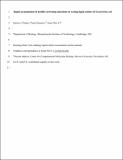| dc.contributor.author | Parker, Darren J. | |
| dc.contributor.author | Demetci, Pinar | |
| dc.contributor.author | Li, Gene-Wei | |
| dc.date.accessioned | 2020-07-16T19:59:27Z | |
| dc.date.available | 2020-07-16T19:59:27Z | |
| dc.date.issued | 2019-07 | |
| dc.date.submitted | 2019-04 | |
| dc.identifier.issn | 0021-9193 | |
| dc.identifier.issn | 1098-5530 | |
| dc.identifier.uri | https://hdl.handle.net/1721.1/126230 | |
| dc.description.abstract | Expression of motility genes is a potentially beneficial but costly process in bacteria. Interestingly, many isolate strains of Escherichia coli possess motility genes but have lost the ability to activate them under conditions in which motility is advantageous, raising the question of how they respond to these situations. Through transcriptome profiling of strains in the E. coli single-gene knockout Keio collection, we noticed drastic upregulation of motility genes in many of the deletion strains compared to levels in their weakly motile parent strain (BW25113). We show that this switch to a motile phenotype is not a direct consequence of the genes deleted but is instead due to a variety of secondary mutations that increase the expression of the major motility regulator, FlhDC. Importantly, we find that this switch can be reproduced by growing poorly motile E. coli strains in nonshaking liquid medium overnight but not in shaking liquid medium. Individual isolates after the nonshaking overnight incubations acquired distinct mutations upstream of the flhDC operon, including different insertion sequence (IS) elements and, to a lesser extent, point mutations. The rapidity with which genetic changes sweep through the populations grown without shaking shows that poorly motile strains can quickly adapt to a motile lifestyle by genetic rewiring. The ability to tune gene expression in times of need outside preordained regulatory networks is an essential evolutionary process that allows organisms to survive and compete. Here, we show that upon overnight incubation in liquid medium without shaking, populations of largely nonmotile Escherichia coli bacteria can rapidly accumulate mutants that have constitutive motility. This effect contributes to widespread secondary mutations in the single-gene knockout library, the Keio collection. As a result, 49/71 (69%) of the Keio strains tested exhibited various degrees of motility, whereas their parental strain is poorly motile. These observations highlight the plasticity of gene expression even in the absence of preexisting regulatory programs and should raise awareness of procedures for handling laboratory strains of E. coli. | en_US |
| dc.description.sponsorship | National Institutes of Health (Grant R35GM124732) | en_US |
| dc.description.sponsorship | National Institutes of Health (Grant T32GM007287) | en_US |
| dc.publisher | American Society for Microbiology | en_US |
| dc.relation.isversionof | http://dx.doi.org/10.1128/jb.00259-19 | en_US |
| dc.rights | Creative Commons Attribution-Noncommercial-Share Alike | en_US |
| dc.rights.uri | http://creativecommons.org/licenses/by-nc-sa/4.0/ | en_US |
| dc.source | Darren Parker | en_US |
| dc.title | Rapid Accumulation of Motility-Activating Mutations in Resting Liquid Culture of Escherichia coli | en_US |
| dc.type | Article | en_US |
| dc.identifier.citation | Parker, Darren J. "Rapid Accumulation of Motility-Activating Mutations in Resting Liquid Culture of Escherichia coli." Journal of Bacteriology (September 2019): e00259-19 © 2019 American Society for Microbiology | en_US |
| dc.contributor.department | Massachusetts Institute of Technology. Department of Biology | en_US |
| dc.contributor.approver | Parker, Darren J. | en_US |
| dc.relation.journal | Journal of Bacteriology | en_US |
| dc.eprint.version | Author's final manuscript | en_US |
| dc.type.uri | http://purl.org/eprint/type/JournalArticle | en_US |
| eprint.status | http://purl.org/eprint/status/PeerReviewed | en_US |
| dspace.date.submission | 2020-07-15T16:57:21Z | |
| mit.journal.volume | 201 | en_US |
| mit.journal.issue | 19 | en_US |
| mit.license | OPEN_ACCESS_POLICY | |
| mit.metadata.status | Complete | |
